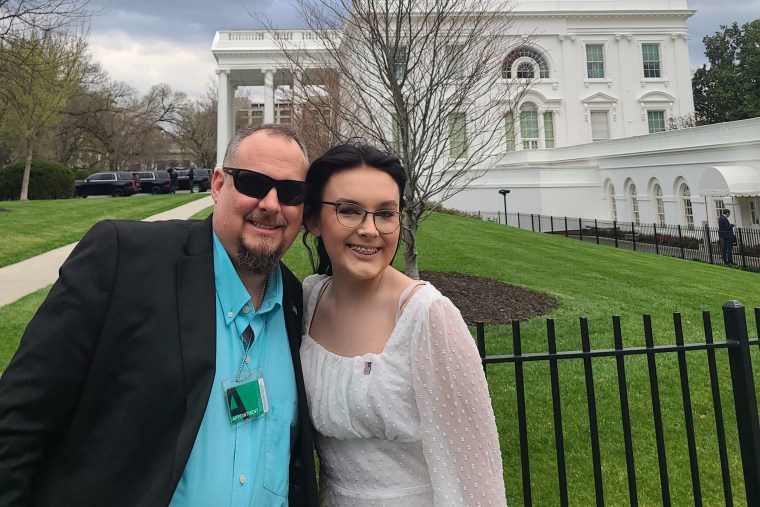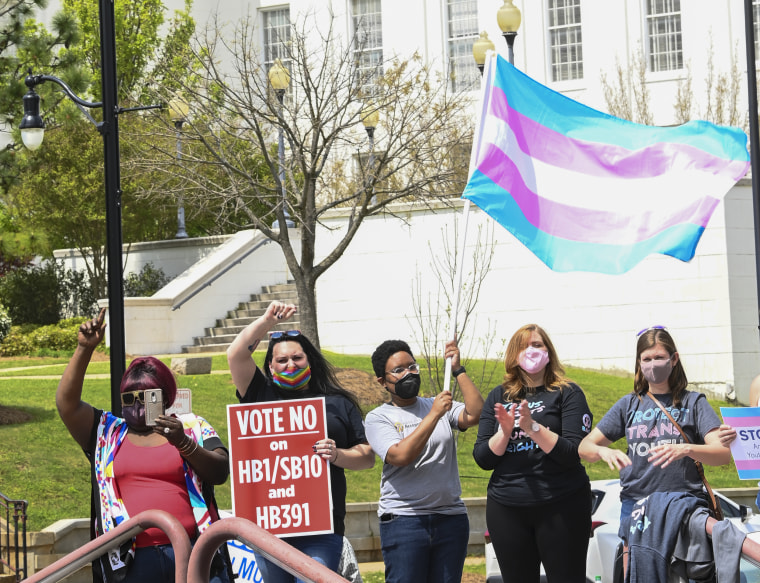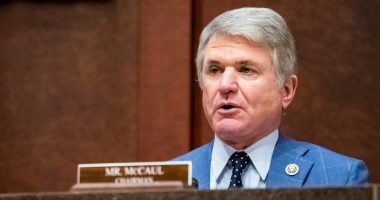Alabama Gov. Kay Ivey signed two bills Friday that target transgender young people and classroom discussion of LGBTQ identities.
One of the bills makes it a felony for medical professionals to provide gender-affirming medical care people under 19.
Her signature makes Alabama the third state in the country to pass a measure restricting transition-related care, though it is the first state to impose criminal penalties.
Ivey said in a statement that she signed the bill because she believes that “if the Good Lord made you a boy, you are a boy, and if he made you a girl, you are a girl.”
“We should especially protect our children from these radical, life-altering drugs and surgeries when they are at such a vulnerable stage in life,” she said in a statement.
Major medical organizations — including the American Medical Association, the American Academy of Pediatrics and the American Psychological Association — oppose restrictions on gender-affirming care for minors and say they go against best practice standards and will harm the wellbeing of trans youth.
Ivey also signed another bill that will bar transgender students from using sex-segregated school facilities that align with their gender identities and will prohibit classroom discussion of sexual orientation and gender identity in grades K-5 — adopting language used in a bill recently signed by Florida Gov. Ron DeSantis that critics have dubbed the “Don’t Say Gay” bill.
Ivey referred to the part of the bill that focuses on bathrooms and other sex-segregated facilities as a “no-brainer” and said it will also “ensure our elementary school classrooms remain free from any kind of sex talk.”
The restriction on gender-affirming medical care will take effect in 30 days unless it faces legal action, which is likely. Two groups of civil rights organizations announced Thursday that they plan to sue should Ivey sign the bill.
The bathroom- and education-related bill will take effect in July unless it faces litigation.
Transgender youth in the state are already bracing for the bills’ impacts.

Ninth grader Harleigh Walker, 15, spends her time after school like many girls her age: doing homework, listening to Taylor Swift, collecting records and hanging out with friends.
But this year, her spring break also included trying to persuade members of the state House and Senate to reject the two bills Ivey signed Friday. If the health care restriction takes effect, Harleigh will no longer be able to take testosterone-blocking drugs.
“Honestly, I’m a little scared now,” she said Thursday after learning the bill had passed. ”But we’re still going to fight no matter what.”
Harleigh said she is holding out hope the bill will be be blocked by a court.
Alabama is among multiple states with Republican-controlled legislatures that have advanced bills not only to block medical treatment but to ban transgender children from using school restrooms or playing on sports teams that don’t correspond with their sex at birth. The Alabama health care bill is one of the most far-reaching: It would put doctors in prison for up to 10 years for prescribing puberty blockers or hormonal treatment to trans kids under 19.

“In one breathtakingly cruel and cowardly day, the Alabama legislature passed the single most anti- transgender legislative package in history,” said Cathryn Oakley, state legislative director and senior counsel for the Human Rights Campaign, a national advocacy group for the LGBTQ community.
Conservative lawmakers say the measures are needed to protect children and parental rights.
“We regulate all kinds of things that are harmful for minors — alcohol, cigarette smoke, vaping, tattoos — because their minds aren’t ready to make those decisions about things that can affect them long term,” said Rep. Wes Allen, the sponsor of the House version of the Alabama legislation. Allen cited public hearing testimony from a woman who said she regretted taking hormone therapy to try to transition to being male.
“With these powerful medications that have detrimental effects on their body long term, we just want to put a pause on it … give them a chance to develop and grow out of that,” Allen said.
But opponents say transgender health is being used as a deliberate political wedge issue to motivate a voting base — in the same way they say bills about critical race theory have been employed. Critical race theory is a way of thinking about America’s history through the lens of racism. Numerous Republican-controlled legislatures have proposed bills to block its teaching in public schools.
The measures involving trans youth have prompted swift backlash from medical experts, Democratic President Joe Biden’s administration, the U.S. Department of Justice and the families of trans youth. Last month, the Justice department sent a letter to all 50 state attorneys general, warning them that blocking transgender and nonbinary youth from receiving gender-affirming care could be an infringement of federal constitutional protections.
“My child is not a political tool. This is not a fair fight to pick on vulnerable children,” said Vanessa Finney Tate, the mother of a 13-year-old trans boy in Birmingham, Alabama, after testifying at a public legislative hearing on bill that would block students from using bathrooms corresponding to their gender.
Harleigh’s father, Jeff Walker, notes that many of the same Alabama lawmakers who supported the ban on gender-affirming medical treatment recently argued, ‘It’s your body and your choice’ regarding coronavirus vaccinations. He said the family is now scrambling to find another state where it can continue Harleigh’s medical care.
“We just don’t want people meddling in our medical care,” he said.
Harleigh received puberty blockers — which stop her from going through male puberty — only after consulting with a team of doctors for years. She said it’s “weird” to see lawmakers with no medical experience call her medication “child abuse,” when six doctors have agreed she should have it.
Similar bans are moving forward in other states.
In Texas, Republican Gov. Greg Abbott has ordered the state’s child welfare agency to investigate as abuse reports of transition care for kids. And a law in Arkansas bans gender-affirming medications. That law has been blocked by a court, however.
Trans youth in many red states say they feel attacked, angry, betrayed and scared by the wave of legislation aimed at them.
“It feels like a back-stab,” Harleigh said. “I’ve lived in this state my whole life. For them to just say, ‘Well, you know what, this is an issue that’s really popular on my side of the aisle so I’m just going to raise it up and support it because it’ll help me win my election’ — It just hurts to see them do that.”
Follow NBC Out on Twitter, Facebook & Instagram
Source: | This article originally belongs to Nbcnews.com








